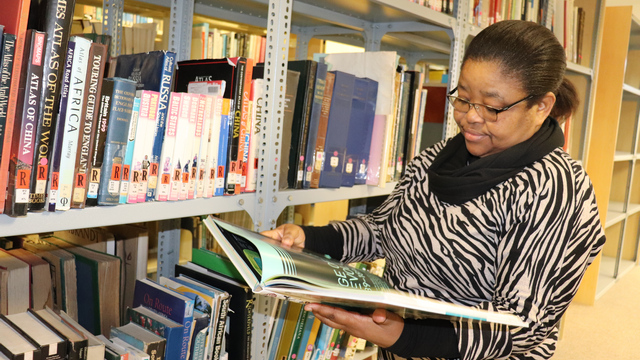
The first democratically elected President of the Republic of South African, Nelson Mandela once said “Education is the great engine of personal development. It is through education that the daughter of a peasant can become a doctor, that the son of a mine worker can become the head of the mine, that a child of farm workers can become the president of a great nation. It is what we make out of what we have, not what we are given, that separates one person from another”.
These are the sentiments shared by the newly appointed Rhodes University Director of Library and Information Services, Nomawethu Danster. She was born and bred in Cofimvaba, in the former Transkei. Her parents were domestic workers and after passing her standard 10 (Grade 12) at Daliwonga Senior Secondary School, they could not afford to send her to university and so she worked at Glen Grey Hospital before receiving financial support from the then Transkei government’s Department of Public Service Commission. “The government wanted to establish libraries in the former Transkei, so they made funds available for studies in this field. I wanted to study law or social work, but I opted for what was available at the time,” she explained.
She undertook her studies in Bachelor of Library and Information Sciences at Fort Hare University and on her fourth year there was student uprising that hindered her from finishing in record time. She completed her degree on year five and was later employed as a Senior Library Assistant at the university. She later enrolled for her Honours degree in Library and Information Sciences at Fort Hare, where she eventually became a Librarian firstly in the main library and later at the Centre for Cultural Studies. She joined the then Border Technikon (Walter Sisulu University) in 1998 as a Senior Librarian. Three years later, she received the Australian Mandela Scholarship to study towards her Master of Applied Science, Information Management at Curtin University, in Perth Western Australia.
In 2005, when the former Border Technikon, former Eastern Cape Technikon and former University of Transkei merged to form the Walter Sisulu University, she led the merger of three libraries as a Convenor and in 2008 she was appointed as the first Director of Library Services for the merged institution. When talking about that year she said: “That was one of the most challenging periods in my professional career because I had to consolidate the strategies of three different institutions to cater for the needs of the new university. The strategy and policies needed to be unique to the new university but still be inclusive of all three institutions”.
Nomawethu took a break from the academic space in 2017, where she was able to reflect on her professional journey. “I used that time to regather and reconnect with the profession. I reflected and could see where the gaps and the loopholes were in the profession and where I needed to improve. I realized that academic libraries were not aligned to the academic programmes of institutions of higher learning. As Librarians, we are knowledge managers and that means that we need to be relevant and move with the times,” she said. In 2018, she accepted the position of the Executive Director: Libraries at the University of Limpopo.
The newly appointed Director assumed her duties at Rhodes University on 01 July 2019. She described her philosophy as one that is open and transparent and as an advocate of the Open Science Movement which embraces open educational resources, open software and open access. “The prestigious journals are hidden behind a pay wall and that makes it difficult for users to access the work of our researchers. The Library through Institutional Repository has established a one stop facility for all research output and the visibility of RU authors. There is no other platform that promotes the image of its own institution better than an “Institutional Repository” We also need to link our Institutional Repository to the Research Information Management System in research development,” she said.
Concerning the relevance of libraries in the e-revolution, Nomawethu said the information on the internet is not as organised as the information in academic libraries. “We organise the information according to the offerings. We realign and organize our learning resources to speak to and enhance teaching and learning, research and community engagement in the academic space, and in that regard we have no competitor” she concluded.
Nomawethu said she is looking forward to collaborate with all the stakeholders of the University to improve on a great job done by her predecessor, Ujala Satgoor.
